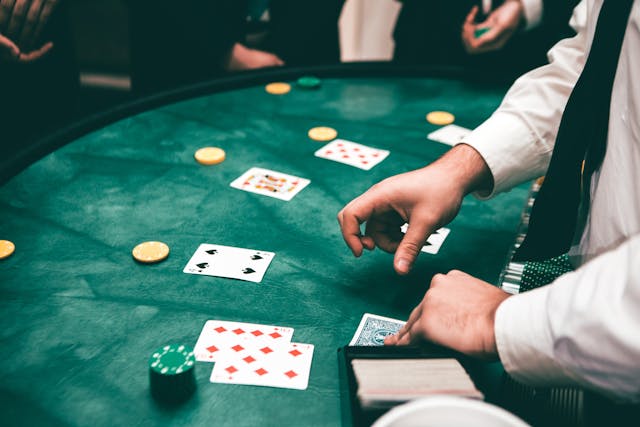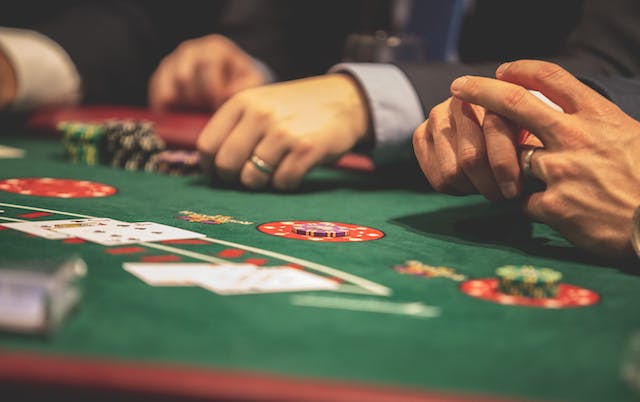In the world of online casino games, blackjack stands out as a classic favourite that combines strategy, skill, and a dash of luck. Among the various moves available to players, doubling down is often considered a high-risk, high–reward decision.
In our guide, we’ll dive deep into the skills of doubling down in blackjack, exploring when it’s advantageous to do so and the strategy behind this bold move.
Continue to read to find out when to double down in Blackjack.
Basics of Doubling Down in Blackjack
Before we delve into the intricacies of when to double down, it’s essential to understand the fundamentals of this move.
Doubling down in blackjack allows players to double their initial bet after receiving their first two cards. However, this move comes with a catch – players are only allowed to receive one additional card from the dealer.
The primary objective of doubling down is to capitalize on a favourable starting hand, increasing the potential payout while minimizing the risk of busting (going over 21). It’s a calculated risk that savvy players use to gain an edge over the house.
When to Double Down in Blackjack: The Best Situations
Timing is everything in blackjack, and knowing when to double down can make a significant difference in your overall winnings.
Here are some of the most advantageous situations to consider doubling down:
- Having a Total of 11 at 랜드마크카지노 If your initial hand totals 11, it’s generally recommended to double down, regardless of the dealer’s upcard. This is because an 11 is a strong hand that has a high probability of becoming a desirable total with just one additional card.
- Holding a Pair of 5s or a Pair of 11s against a Dealer’s Upcard of 2 through 6 (랜드마크카지노주소) When you have a pair of 5s or a pair of 11s, and the dealer’s upcard is a low value (2 through 6), doubling down can increase your chances of beating the dealer’s hand. This move is particularly advantageous because you have a high chance of improving your hand without the risk of going bust.
- Holding a Hard 9 against a Dealer’s Upcard of 3 through 6, read our blackjack tips. A hard 9 (a hand totalling 9 without an ace) can be a tricky situation. However, if the dealer’s upcard is between 3 and 6, doubling down can be a wise choice. This move allows you to improve your hand while taking advantage of the dealer’s weaker upcard.
- Holding a Hard 10 or 11 against a Dealer’s Upcard of 9 or Lower (wow, Blackjack Odds Works) When you have a Hard 10 or 11, and the dealer’s Upcard is 9 or lower, doubling down can be profitable. These strong starting hands, combined with the dealer’s potentially weaker hand, make it an optimal time to increase your bet and maximize your winnings.

Do you double down on 9, 11 or 6?
These are common questions that players often have when it comes to doubling down in blackjack. The answer is not always straightforward and depends on the specific situation and the dealer’s upcard.
For a hard 9, doubling down is generally recommended only when the dealer’s upcard is between 3 and 6. This is because a hard 9 is a relatively weak hand, and doubling down against a higher dealer’s upcard increases the risk of busting.
On the other hand, doubling down on an 11 is almost always a wise decision, regardless of the dealer’s upcard. An 11 is a strong hand that has a high probability of becoming a desirable total with just one additional card, making it an optimal situation to double down and potentially increase your winnings.
Related: What is a Blackjack Hunting?
How Blackjack Odds Works?
To further illustrate the strategic value of doubling down, let’s consider some relevant statistics and data.
According to various blackjack simulations and analyses, doubling down on a hard 11 against any dealer’s upcard can result in an average gain of approximately 1.5% compared to not doubling down.
Similarly, when holding a pair of 11s against a dealer’s upcard of 2 through 6, the player’s advantage increases by roughly 1.2% when doubling down.
These statistical insights highlight the potential benefits of doubling down in specific situations, reinforcing the importance of strategic decision-making in blackjack.
However, it’s crucial to note that these statistics are based on theoretical calculations and simulations.
In real-life gameplay, factors such as the casino’s specific rules, the number of decks used, and variations in the composition of the remaining cards can influence the optimal strategy.
Bankroll Management and Risk Considerations
While doubling down can be a powerful move in blackjack, it’s essential to consider your bankroll management and risk tolerance.
Doubling down essentially means doubling your bet, which can quickly deplete your bankroll if not done judiciously.
It’s advisable to set a strict budget for each blackjack session and only double down when you’re comfortable with the potential loss.
Additionally, it’s crucial to understand that doubling down is a calculated risk, and even in optimal situations, there’s still a chance of losing the hand.
When to Double Down in Blackjack: Final Thoughts
Mastering how and when to double down in blackjack can be a game-changer for players looking to enhance their chances of winning.
By understanding the optimal situations, such as holding an 11, a pair of 5s or 11s against a low dealer’s upcard, a hard 9 against a 3 through 6, or a hard 10 or 11 against a 9 or lower, players can make informed decisions and capitalize on favourable opportunities.
However, it’s essential to remember that doubling down is a calculated risk, and bankroll management should always be a priority.
By combining strategic decision-making, statistical insights, and responsible gambling practices, players can navigate the exciting world of blackjack with confidence and potentially increase their chances of success.
So, the next time you find yourself at the blackjack table, keep these doubling-down strategies in mind, and remember – sometimes, it’s worth taking that calculated risk to double down and potentially double your winnings.



